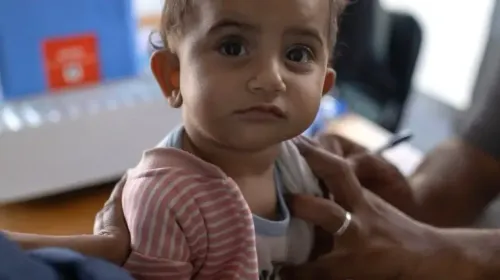How Can Countries Enhance Access to Affordable, Science-Based Fertility Care?

Synopsis
Key Takeaways
- WHO's Guidelines: The first global guidelines on infertility care.
- Access to Care: Urgent need to improve access to affordable care.
- Emotional Support: Continuous psychosocial support is vital.
- Financial Burden: Many individuals face catastrophic costs for treatments.
- Collaboration Needed: Implementation requires cooperation across various sectors.
Geneva, Nov 28 (NationPress) The World Health Organization (WHO) has urged nations to improve accessibility to affordable and science-driven fertility care for individuals confronting infertility challenges.
According to the WHO, infertility is defined as the inability to conceive after 12 months or more of consistent unprotected sexual intercourse.
Affecting approximately 1 in 6 individuals of reproductive age at some point, infertility can lead to considerable distress, stigma, and financial burdens, ultimately impacting mental and psychosocial health.
In its inaugural global guidelines for the prevention, diagnosis, and management of infertility, the WHO advocates for safer, equitable, and more affordable fertility care.
This guideline consists of 40 recommendations aimed at enhancing the prevention, diagnosis, and treatment of infertility.
It promotes cost-efficient solutions at all stages and encourages the integration of fertility services into national health frameworks, resources, and financial planning.
“Infertility is one of the most neglected public health issues today and a significant equity concern on a global scale,” stated Dr. Tedros Adhanom Ghebreyesus, Director-General of WHO.
Despite an increasing demand for infertility services globally, access to such care remains severely restricted. In numerous countries, infertility tests and treatments are primarily funded out-of-pocket, often leading to financial devastation.
In certain regions, a single round of in vitro fertilization (IVF) may cost twice the average annual household income.
The guideline provides detailed clinical management strategies for infertility, highlighting the importance of addressing major risk factors, such as untreated sexually transmitted infections and tobacco use.
Additionally, it outlines clinical pathways to identify common biological causes of infertility in both males and females.
Recognizing the emotional challenges associated with infertility, which can lead to depression, anxiety, and social isolation, the guideline underscores the necessity for continuous psychosocial support for all affected individuals.
“Millions are navigating this journey in solitude—excluded from care, driven toward less reliable yet cheaper treatments, or forced to choose between their aspirations of parenthood and financial stability,” Ghebreyesus remarked.
“We urge more nations to implement this guideline, providing more individuals with the chance to access affordable, respectful, and science-based fertility care,” he added.
WHO encourages countries to tailor these recommendations to their local contexts and to track their progress. Successful execution will require collaboration across health ministries, professional health societies, civil organizations, and patient advocacy groups.









